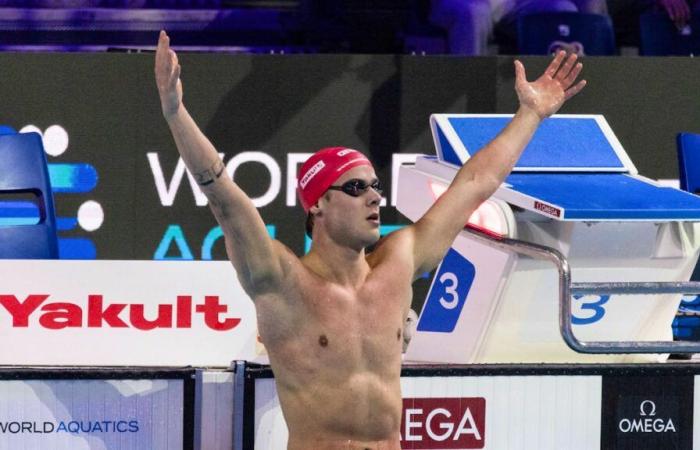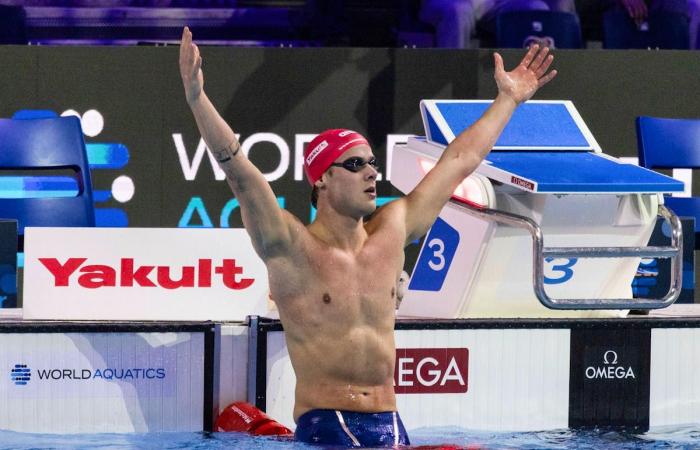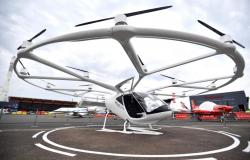Noè Ponti reached a new dimension in Budapest, during the Short Course World Championships.
Imago
“For the first time I can say there is nothing to complain about.” Like many observers, Markus Buck, head of performance sport at Swiss Aquatics, was stunned by Noè Ponti’s Short Course World Championships in Budapest.
In the space of four days, from Tuesday December 10 to Saturday 14, the Ticino native won three gold medals – in the 50m butterfly, 100m medley and 100m butterfly – and broke three world records. Twice in the 50m butterfly, establishing a new reference mark at 21”32, then in the 100m butterfly where he dislodged the time of 47”78 achieved in November 2020 by his idol Caleb Dressel (9 times Olympic champion and 15 times world champion, no less).
As with Léon Marchand at the Paris Olympic Games, there will be a before and after Budapest 2024 for Noè Ponti. The latter had already distinguished himself in major international competitions, in short course (seven medals including three gold at the 2023 Europeans) as well as in the long distance (tanned at the 2021 Olympics and vice-champion of Europe 2022, each time in the 100 m butterfly), but never with such brilliance. Enough to take him, at 23, into another dimension. His sequence sends him to the top of the pantheon of Swiss swimming which, until last week, had never placed one of its representatives in first place in the World Championships.
Innate skills for the short course
“I’m impressed, what he accomplished is crazy,” comments Jérémy Desplanches. The Genevan, bronze medalist in the 200m medley at the Tokyo Games and European long course champion in 2018 over the same distance, is not however surprised by the performances of his young friend: “To have him seen in action, he trains hard and has an aberrant dose of talent. When these two elements come together, it creates an explosive combo.”
“Noè is a salmon. When he’s underwater, it slides across his skin where others face more resistance.”
Several factors contributed to Ponti’s resounding success in the Hungarian capital. Starting with his own skills. “In the short course, Noè is above the rest,” underlines Jérémy Desplanches. This is a configuration where you have to be strong in flows and turns. It takes practice, of course, but it’s an innate quality, which requires a particular feeling with water. This was not my case – however, it is an aspect on which I have worked for a long time – and that is why I focused on long course competitions. Noè is a salmon. When he’s underwater, it slides over his skin where others – including me – are subject to more resistance.
In Olympic form
The native of Locarno also benefited from a favorable calendar, after an Olympic year. “Many athletes arrived at the Worlds in better shape than usual, because they are a continuation of the Games,” notes Roman Mityukov, present in Budapest where he stood out less, eliminated in the 100m backstroke heats. , 100 m freestyle and 200 m backstroke, despite a new Swiss record obtained in the 4×100 m medley relay. “Once the Olympics are over, we release the pressure and swim completely free while we are still at the top. That’s where it sparks,” adds Jérémy Desplanches, newly retired from swimming pools.
Frustrated in Paris (he had to settle for 4th place in the 100m butterfly), Noè Ponti was also driven by a vindictive state of mind. “In previous years, he had no interest in preparing for short course competitions since there was the prospect of the Olympics, which take place in long course. There he had the opportunity and he enjoyed it. When we see his results, he was completely right,” agrees Jérémy Desplanches.
A swimming pool conducive to records
In Hungary, performances were also boosted by the swimming conditions. Unlike that of Paris La Défense Arena this summer, the swimming pool at the Danube Arena is conducive to records with its depth of 3 m. “Specialists say that this is ideal for going as quickly as possible,” relays Roman Mityukov. Jérémy Desplanches elaborates: “The more water there is, the fewer waves there are. And the less shaken the swimmers are, as a result. At this level, it’s a detail that counts.”
This is evidenced by the number of world records broken during these Worlds: 30, including 11 by Gretchen Walsh alone. “It’s astonishing and at the same time, it gives the impression that the achievement is devalued,” smiles Desplanches. I would have preferred this shower of records to be spread out, in order to preserve the charm of the moment. But that doesn’t take away from the accomplishment.”
In harmony with his work environment
Finally, the consecration of Noè Ponti is that of a method. Having left for the United States in the summer of 2021 with the aim of combining studies and high-level sport, the Swiss backed out after a month. Returning to Ticino, he has since been coached by a coaching duo composed of Massimo Meloni and Andrea Mercuri. An environment more conducive to its development. “This trio is very effective,” notes Jérémy Desplanches. There is real complicity, friendship and a huge amount of mutual respect. At the same time, Noè is close to his family, it’s something he needs. In short, he found the cocoon he needed.”
Roman Mityukov agrees: “Our surroundings are decisive in our success. Our sport is already so difficult, with all the rigor we impose on ourselves on a daily basis, that if you can’t open up about what you feel to those close to you, and especially to coaches, it becomes untenable. We should be able to talk about everything. Coaches are also friends, even psychologists. In swimming, communication is fundamental.
Mix all these ingredients and you get Noè Ponti on the roof of the world. And rather three times than one.







